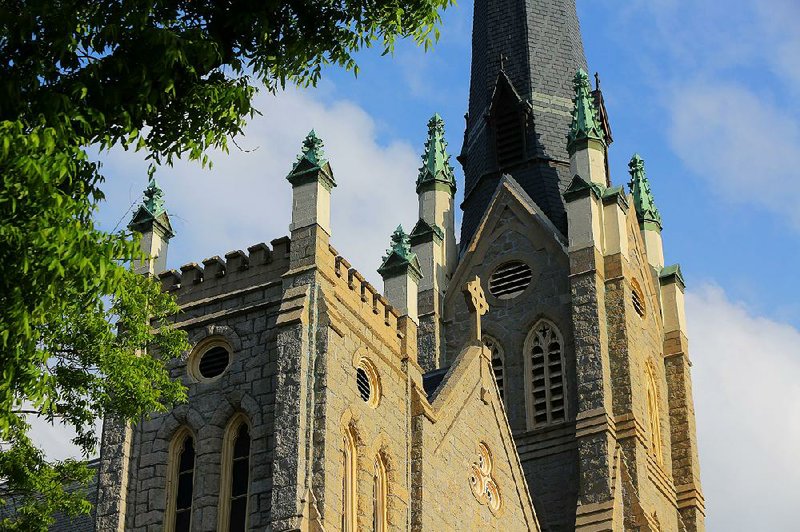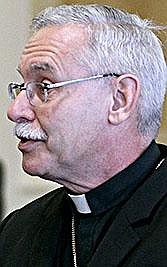A priest and a religious brother have been added to the Diocese of Little Rock's list of Arkansas church officials who have been "credibly" accused of sexual abuse of a minor, and a consulting firm's review of local handling of allegations has been completed, Bishop Anthony B. Taylor said in a letter Friday.
The diocese, which oversees all Catholic churches in the state, announced in the letter additions to the list of accused officials that was initially released Sept. 10 and last publicly updated Oct. 23.
The list, available on the diocese's website at www.dolr.org, now includes 17 priests and four members of religious orders. That total consists of people the church found to have been credibly accused of sexual abuse in Arkansas and individuals who were accused elsewhere but served in the state at one time.
"I once again ask for your prayers for all the victims of sexual abuse from whatever source, but in particular those who have been abused by a priest, a deacon or other representative of the Church," Taylor wrote. "I would like to renew my call for any others who have been abused or know someone who has been abused to come forward."
Taylor had just returned from a trip to India and wasn't available for comment Friday, diocese Chancellor for Administrative Affairs Dennis Lee said in an email.
The bishop's letter, which was provided to the media and posted online Friday morning, referred back to the September release of the Arkansas list, after which the diocese received several new reports from the public alleging sexual abuse within the church.
None of those claims was related to priests in active ministry or took place after 2002, Taylor wrote. That year, the U.S. Conference of Catholic Bishops released a document consisting of guidelines and recommendations intended to address the sexual abuse crisis.
However, the reports required updating of the list, which was released Oct. 23 and Friday. Taylor's letter also noted possible "boundary violations" by an Arkansas priest, though "none of these seem to rise to the level of child sexual abuse," he wrote.
Asked for clarification on what that meant, Lee said Taylor's letter "will have to suffice for today."
Church officials said in earlier interviews and statements that allegations were deemed "credible" on the basis of the presence of similar allegations, information from personnel files, interviews and after consideration by the Diocesan Review Board, which consists of 10 people who are not employed by the diocese.
By naming priests thought to have been involved in sexual abuse, the Diocese of Little Rock joined dioceses across the nation taking similar action in the wake of a 2018 grand jury report that documented the decades-long cover-up of hundreds of sexual-abuse allegations in Pennsylvania. In one recent announcement, Catholic dioceses in Texas released lists totaling close to 300 accused priests who held posts in that state, according to January reports.
The disclosures are the "absolute bare minimum" the church can do, said David Clohessy, the former national director of the Survivors Network of those Abused by Priests.
"It's frustrating to see that action happens only when bishops feel the heat," he said. "On the one hand, every time a predator's name is exposed, survivors feel some degree of validation. On the other hand, most survivors feel very frustrated because these potentially dangerous men should have been outed decades ago."
On Friday, Taylor also marked the completion of a review of more than 1,350 diocesan personnel files by Kinsale Management Consulting, an organization that provides input on workplace-violence prevention, child-abuse prevention, employee misconduct and other topics for businesses and faith-based organizations, according to its website.
Ten reviewers spent about 658 hours on the assessment, an exit letter from Kinsale posted on the Diocese of Little Rock's website said. The group looked at files from 1886, which was the earliest year available, through October 2018.
"[Kinsale] made no dramatic discoveries, but their efforts confirmed that we have a clear understanding of the scope of incidents of clergy sexual abuse committed in the past," Taylor wrote.
In "some, but not all" of the files, the group said in the exit letter, information "reflected a variety of actions consistent with the most common activities of other dioceses in the United States relative to alleged offenders during that time period," including referrals for evaluation, psychological treatment and reprimands.
Recent handling was more extensive and thorough, the group found.
It wasn't clear if or how much the group was paid for its investigation, or by whom. Lee said he couldn't immediately provide details because he had only partial information, and a call and email to the consulting group requesting comment weren't returned.
Taylor also mentioned external reviews underway at several orders, including Subiaco Abbey, which is a monastery and preparatory school in Logan County. Three individuals on the Diocese of Little Rock's list of accused officials once held postings there.
Subiaco Abbey Abbott Leonard Wangler said in a telephone interview that a Chicago-based group of attorneys is conducting the review, which began in October and is expected to be completed within the next couple of weeks.
"We wanted to make sure that everything got revealed and out in the open," he said.
Results will be disseminated within the organization and posted on its website.
Since 2002, Taylor wrote, the Diocese of Little Rock has spent about $205,000 in insurance funds on counseling and assistance to people who have alleged sexual abuse by priests, but has not paid any legal claim settlements related to priests named on the disclosure list.
In earlier interviews and statements, Taylor said church officials would work with the Arkansas attorney general on a review that the office planned to conduct of the diocese's handling of abuse allegations.
That office does not comment on possible investigations, a spokesman said, but added that "the attorney general will not tolerate abuse and will work with local prosecutors and the Catholic diocese to address any issues in Arkansas."
A report on how previous bishops addressed allegations is forthcoming in a weekly newspaper published by the diocese, Taylor wrote.
Taylor has led the Arkansas diocese since 2008, succeeding Bishop Peter Sartrain and administrator Gaston Hebert.
Like other communications from the diocese in recent months, Friday's letter again said individuals who know of abuse should step forward by calling the Arkansas Child Abuse Hotline at (800) 482-5964; Deacon Matthew Glover, who is chancellor for canonical affairs; or a victims assistance coordinator within the church.
A healing Mass for victims of sexual abuse is set for 5 p.m. April 28 in Morris Hall Chapel in the St. John Catholic Center in Little Rock.
A Section on 02/09/2019

